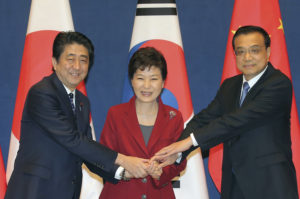Japan, South Korea, and China to Accelerate FTA Negotiation
Trade chiefs from Japan, China, and South Korea vowed on October 29 to fight against protectionism and enhance cooperation in the energy sector at the eleventh Trilateral Economic and Trade Ministers’ Meeting. The next day,  of Japan confirmed the pledge during their meeting at the Blue House, South Korea’s presidential headquarters in Seoul.
Hiroshige Seko, Japanese Minister of Economy, Trade, and Industry, said that the three countries “reached consensus on jointly advancing economic structural reform.” His South Korean counterpart, Joo Hyung Hwan, commented that the trio agreed to establish a “trilateral cooperation framework” and speed up the negotiation process for existing free trade deals. Chinese Commerce Minister Gao Hucheng said that “they managed to reach an outcome that could help their leaders realize their common views in promoting economic and trade activities.” None of the Ministers gave a concrete timeline or a detailed plan for how they would strengthen cooperation.
of Japan confirmed the pledge during their meeting at the Blue House, South Korea’s presidential headquarters in Seoul.
Hiroshige Seko, Japanese Minister of Economy, Trade, and Industry, said that the three countries “reached consensus on jointly advancing economic structural reform.” His South Korean counterpart, Joo Hyung Hwan, commented that the trio agreed to establish a “trilateral cooperation framework” and speed up the negotiation process for existing free trade deals. Chinese Commerce Minister Gao Hucheng said that “they managed to reach an outcome that could help their leaders realize their common views in promoting economic and trade activities.” None of the Ministers gave a concrete timeline or a detailed plan for how they would strengthen cooperation.
The combined trade volume of the three countries accounts for 20 percent of the world’s trade. Currently, Japan, South Korea, and China are in the process of negotiating two free trade deals, one strictly among themselves (China-Japan-Korea Free Trade Agreement), and the other, the Regional Comprehensive Economic Partnership (RCEP), for the greater Asia and Oceania region, which involves ten countries in total.
The concept of a free trade zone among Japan, South Korea, and China dates back to 2002. The negotiation process, however, did not begin until ten years later. In the ensuing four years, negotiation advanced rather slowly. According to a researcher at the Ministry of Commerce of China, the trade deal has not entered a “formal negotiation process.”
The root cause for the slow progress lies with the competition between Japan and South Korea. In fact, both nations are eager to have more access to the Chinese market at the cost of opening up their own. A bilateral trade deal between China and South Korea has been in effect since the end of 2015. Given the complementary nature of the products that China and Japan produce, both would gain considerably from trade liberalization.
For South Korea and Japan, however, the situation is somewhat different. Since the main exports of both countries are substitutes, a free trade agreement will introduce fierce competition. For instance, the trade deal will likely enable Samsung to sell its home appliances at a lower price in the Japanese market and help Toyota compete with Hyundai.
As the United States decides to abandon Trans-Pacific Partnership (TPP) in light of the election of Donald Trump, the world is in need of new free trade advocates. Given the current economic outlook and the three countries’ long history of mutual grievances, it is commendable that they still uphold and promote the spirit of free trade. Despite the problems currently presented, the trade deal will hopefully prove that it is worth the effort.
